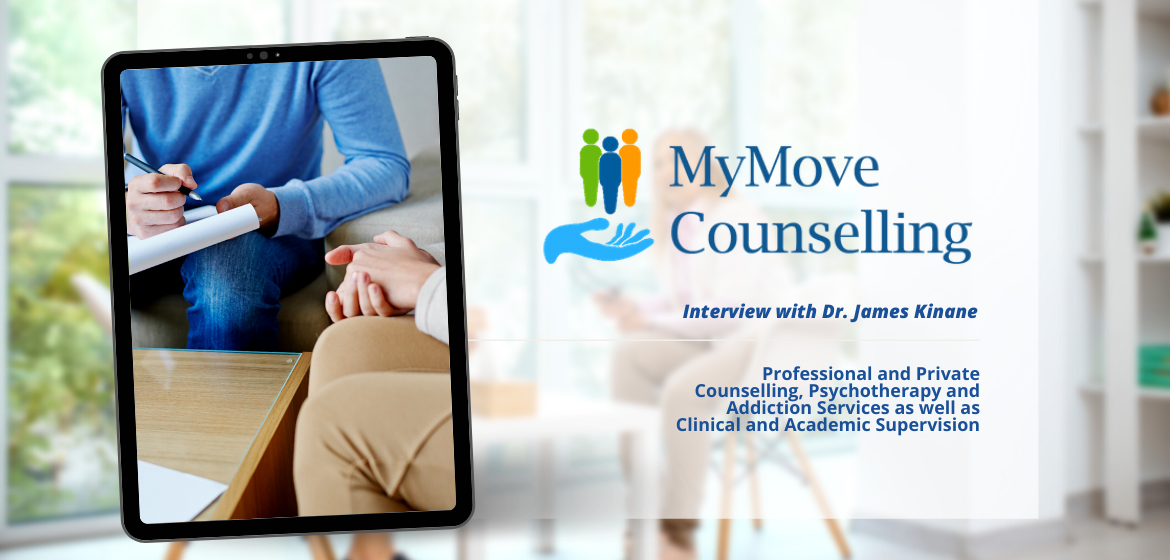
Interview with Dr. James Kinane of MyMove Counselling
Recently we chatted with Dr. James Kinane of MyMove Counselling. MyMove Counselling provides professional and private counselling, psychotherapy and addiction services as well as clinical and academic supervision. During the interview we discussed:
- About MyMove Counselling?
- Main areas that MyMove Counselling focuses on?
- A day in the life at MyMove Counselling?
- Practice Placement at MyMove Counselling?
- How Practice Placement with MyMove can benefit students in their application of theory to practice
- The support for students on Practice Placement?
- Any particular areas that are topical at the moment?
You can listen back to the full interview as part of episode 1 of our new podcast series below.
The full interview transcript is also available.
Tell us more about MyMove Counselling?
MyMove Counselling recently celebrated its one-year birthday. The idea behind establishing with two purposes really, the first being the issue around addiction and mental health. It’s really a challenge for many, many different institutions as to how they’re trying to manage to bring these together. So we decided we’re having have a look at this, as a challenge, can we have them dealing with addiction without dealing with some mental health issues, and you’re seldom dealing with mental health issues in some way, either impacting directly with the individual or with their family in terms of addiction. That was sort of our initial thinking.
Then the other part that I had a keen interest in, in work in teaching and lecturing and teaching and working with students, and offering them a place where in their practice placement they get a firsthand insight into how these two entities would either work together or improve their skills around this, with appropriate supervision, and ongoing development and reflection.
So those were the two things that really set this in motion for me. Following on from that of course the main areas that we are concerned about is the one to one counselling for the mental health issues can be anything from anxiety, depression, to bipolar, to borderline conditions, or a combination of issues for the individual and for their families.
That’s on one side of it and then we started with the addiction. Of course, I would be very familiar with addiction, because I’ve worked for many years in treatment centres, and evaluated them. So when we bring a person in for addiction, we’re bringing the family members, and then we start working with both.
So the students that I have coming in here they’re up for the challenge of individual counselling for the mental health side of it and the combined stuff between mental health and addiction. Then, of course, the addiction itself. In the last five or six months, we put together a treatment program for addiction and an outpatient program, basically, where people haven’t either the time or the inclination are taught to add to residential treatment, which is usually to take time out, you have to, you have to arrange the funding. So we’ve put together a 12-week program that allows people to continue to work, stay in the community, stay attached to their families, and over a 12-week period, with the counsellors we’re able to bring them to a place of recovery.
So this is kind of tolling the embryo stage, because we wanted to try innovative stuff, first around linking mental health and addiction. Then we want to try to innovate and develop a cohesive program to allow people to talk, stay connected, stay engaged with and connected with the community, while at the same time seeking treatment in a very nonthreatening and very compassionate environment.
So that’s kind of the basis of where we’ve come. We’re going through an aftercare care process. And the traditional aftercare process, for most people, would be once a week, attending, face to face, what we’re doing is we’re providing the one to one counselling for the person over the next nine months. We’re also providing the evening for family members once a week for nine months. We’re also providing a group setting for the people in recovery on a weekly basis for nine months because I believe you need the aftercare to be bedded down. People really need support when they’re actually getting well as much as they need support when they’re actually trying to get well.
What’s an average day like for a student on practice placement at MyMove Counselling?
An average day would go something like this. The students are allocated three clients each. So they have their day, maybe their afternoon or evening or morning. We tried to lock them together so that people can traipsing in and out coming up and down the tracks all the time. But they have their clients, then they give their feedback to one of us on the clients, then we process that as a team. Then we give that feedback to the supervisor to the student that the supervisee.
In addition to that, from the point of view of support, each student in placement also has to have their own external supervisor, as recommended by the college. But we also supply an external supervisor as well for them. So they have someone who has extensive experience that they go to once a fortnight, so they’re actually processing externally, as well as their own individual supervisor.
They have the treatment team, supporting them internally working through some of the cases that are fine, initially, and then eventually, emerging issues come up and problems or family’s problems emerge. That’s where the student needs to have additional support. So I really believe big time in supervision. I also really believe in supporting students in every way possible. Because they’re eager to learn, they have two years, maybe three years experience coming into this, and they’re able to have lots of ability, and it’s just to provide as safe as possible an environment for them to exercise those skills.
Know that we’re dealing with two entities (with mental health and addiction), one can be difficult enough, when we’re dealing with two or three addictions, and you may be doing three or four issues with a family, a counsellor coming into MyMove is going to be challenged, but are also going to be supported.
How can practice placement with MyMove can benefit students in their application of theory to practice
I often say that, when somebody is dealing with someone who has depression or a bit of anxiety, that you have a bit of time and you can pace it a bit easier, or prediction, the stuff is coming at you so fast, and the clients, you’d have had to live on the edge.
So, therefore, the environment is very fast pace. The counsellor really gets to challenge themselves, and there is a lot of space for the reflective practice. What went on? How did it go on, and then bring that back to us. So it really allows them to grow faster. When people come in they may have never had a chance in 30/40 years to ever talk about anything and they have so much to talk about and try and work through that.
That’s why they have immediate support around them. So they will be here to be challenged. They’re grown up, and that the feedback so far from the students from the year, and I’m doing the appraisers at the moment is that yeah, they’re greatly challenged, because you’re in the front of the coalface of this, whether or not you’re alone, and are never alone in a room because of the, you know, a phone call away a room away, there’s a supervisor or a manager that’s going to support you and take you through any issues that come up.
So that support rather than just going into a placement, showing up with for their hours doing the placement and going home, they’re actually walking with us all the way through there, they are another pair of eyes that we have when they’re going into these rooms.
So how’s the experience been for students who have been on placement?
Initially, when we started MyMove Counselling we didn’t expect such a diverse group of people. We didn’t expect to be so busy. We have up to 15 counsellors at the moment which is unbelievable after just one year’s work. We didn’t expect to have maybe one or two students, but you know, it would need to be met and the models provide more and more and more.
So it has been challenging. It has been a good thing and as you can imagine, if you have that spectrum of people coming at you, you’re going to get such a variety. I suppose the challenge for us often is to make sure that we can get a student or counsellor as near as possible to match the clientele that’s coming in. Some people need a lot of tender care, some people need that kind of consultation and style.
Are there any particular areas that are very topical, or that have come to light, since MyMove Counselling has started?
Some of the biggest areas that has come to light is young people and addiction and trying to cope in the aftermath of the pandemic. Their very identity has been shot through, and people have taken different strands on how to manage this. For a lot of young people, it’s cocaine, and it’s addiction, and it’s all that behavior. Other people are presenting quite young, they have become somehow detached, or are trying to reattach themselves back to where they were two or three years ago.
That’s kind of an emerging phenomenon. I don’t think we will actually know the full extent of what COVID has actually done and it doesn’t matter whether you’re a young person or an elderly person or a middle-aged person, it has impacted people in terms of how they socialise, connect, form friendships & form intimacy. So I think that people need an adjustment process.
That’s why probably quite a number of the counselling services are quite busy at the moment, people might need six sessions or eight sessions but they need to connect back in, and you can’t do at home, and you can’t do it with your friends, because they’re wondering is something the matter with you, they probably have the same stuff going on, they don’t understand that either.
So actually, other issues that are emerging. For young men for example particularly their identity. You know their identity in the past might be shaped around playing GAA and when that was all deprived from them the last couple of years they’re now struggling with identity.
So how do you mitigate that you take cocaine or something, and so on. So there’s more of that going on as well. We’re only beginning to pay the price really the second phase of dealing with COVID.
If anybody wants to learn more about MyMove counselling, you’re working with a find out additional information.
There’s a web page MyMove Counselling. We also have an office in Limerick and Tipperary Town. We’re open for pretty much, seven days a week, and any time you can contact us.


























